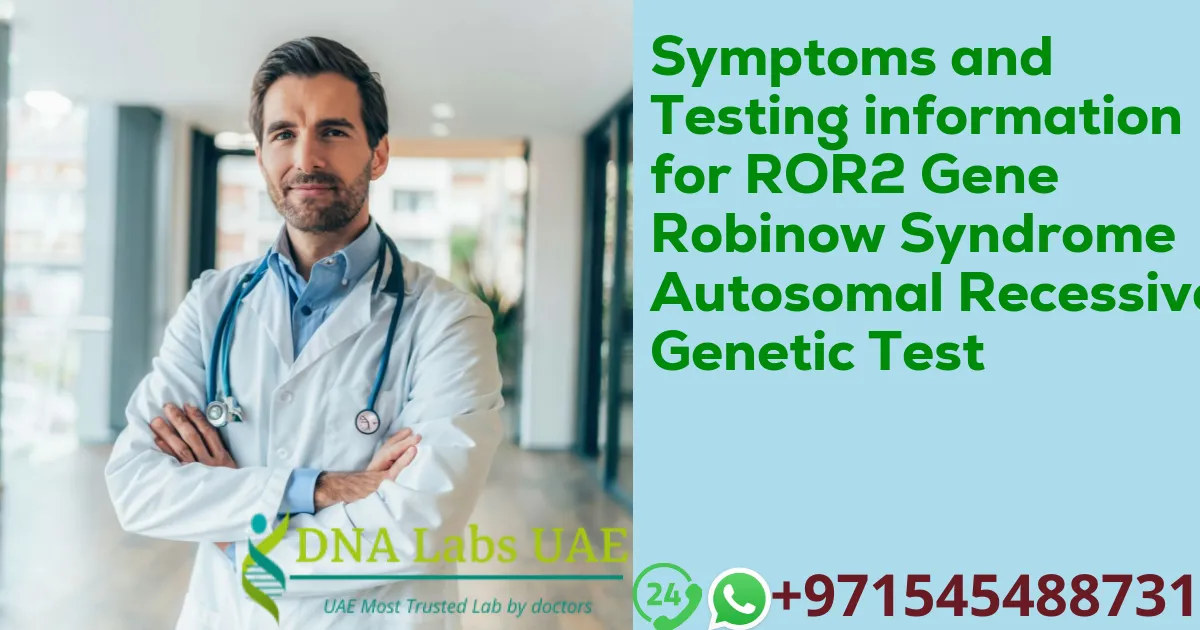In the realm of medical genetics, understanding the implications of specific gene mutations is crucial for diagnosing and managing various conditions. One such condition, Robinow Syndrome, is a rare genetic disorder that affects the development of the body’s bones and other structures. This disorder can be particularly challenging to diagnose due to the variability in its presentation. However, advancements in genetic testing, such as the ROR2 Gene Robinow Syndrome Autosomal Recessive Genetic Test, have made it possible to identify this condition with greater accuracy. This article delves into the symptoms associated with Robinow Syndrome, the significance of the ROR2 gene, and details regarding the genetic test, including its cost.
Symptoms of Robinow Syndrome
Robinow Syndrome is characterized by a range of physical manifestations that can vary significantly from one individual to another. The most common symptoms include:
- Short stature, often noticeable from birth
- Limb abnormalities, including short forearms and lower legs
- Genital hypoplasia in males
- Distinct facial features, such as a wide mouth, an upturned nose, and a prominent forehead
- Dental problems, including crowded teeth and gum issues
- Heart defects and other internal organ anomalies
It’s important to note that the severity of these symptoms can vary widely among affected individuals. Some may experience mild manifestations, while others may face more severe challenges.
The Role of the ROR2 Gene in Robinow Syndrome
The ROR2 gene plays a critical role in skeletal development and the regulation of cell movement and growth. Mutations in this gene are responsible for the autosomal recessive form of Robinow Syndrome. In autosomal recessive inheritance, an individual must inherit two copies of the mutated gene, one from each parent, to be affected by the condition. Parents of an affected individual typically do not show signs and symptoms of the condition.
ROR2 Gene Robinow Syndrome Autosomal Recessive Genetic Test
The ROR2 Gene Robinow Syndrome Autosomal Recessive Genetic Test is a comprehensive diagnostic tool designed to detect mutations in the ROR2 gene. This test is crucial for confirming a diagnosis of Robinow Syndrome, especially in cases where the clinical symptoms may be ambiguous. By analyzing an individual’s DNA, the test can identify specific genetic alterations associated with the condition, providing valuable information for managing and treating the disorder.
Test Cost
The cost of the ROR2 Gene Robinow Syndrome Autosomal Recessive Genetic Test is 4400 AED. While the price may seem significant, it is important to consider the value of a definitive diagnosis. A confirmed diagnosis can lead to more personalized care plans, potential treatments, and the opportunity for genetic counseling for families.
Conclusion
Robinow Syndrome is a complex condition that requires a comprehensive approach to diagnosis and management. The ROR2 Gene Robinow Syndrome Autosomal Recessive Genetic Test offers a crucial resource for individuals and families seeking answers about this rare disorder. By providing a clear genetic basis for the condition, the test paves the way for targeted interventions and support. For more information and to schedule a test, visit DNA Labs UAE.
This article provides a detailed overview of the symptoms associated with Robinow Syndrome, the role of the ROR2 gene, and the significance of the genetic test designed to diagnose this condition. Understanding these aspects is essential for affected individuals and their families as they navigate the complexities of this rare genetic disorder.



